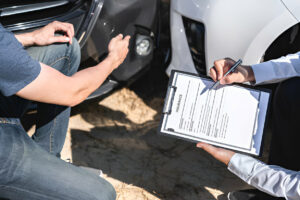Comprehensive car insurance provides the highest coverage for your vehicle and any other parties involved in an accident. It is often called “fully comprehensive” Insurance, offering extensive protection for various situations beyond just accidents.
How Does Comprehensive Vehicle Insurance Work?
Comprehensive Insurance covers damages to your vehicle and injuries to you or others, regardless of who is at fault for the accident. It also includes a range of other protections like theft, fire, and damage from natural disasters. This policy gives you peace of mind by offering all-around coverage.
Key aspects include:
- Covers damages to your vehicle from accidents, natural disasters, theft, or vandalism.
- Personal injury protection for you, passengers, and others involved in an accident.
- No-claim discount: If you don’t claim for a year, you may qualify for a discount on your premiums.
Key Points of Comprehensive Insurance
- Coverage for Various Incidents: Comprehensive Insurance covers fire, theft, damage caused by animals or natural disasters, and accidents, regardless of fault.
- Additional Coverage: It covers your vehicle repairs, damage to your personal belongings (subject to policy conditions), and even windscreen repairs.
- Costs:
- Paying a higher excess may reduce your monthly premium.
- If your vehicle is financed, you will likely need comprehensive Insurance to meet the lender’s requirements.
2. Animals and Natural Disasters:
- This policy is ideal if you live in areas prone to accidents with animals or natural events like storms, flooding, or falling trees.
Difference Between Comprehensive and Third-Party Insurance
- Third-Party Insurance: This only covers damages to other vehicles, property, or people. It does not cover any damage to your car.
- Comprehensive Insurance covers your vehicle’s damage (even if you’re at fault) and third-party damages.
Comprehensive Insurance is much more extensive, providing excellent protection in various situations.
What Does Comprehensive Insurance Cover?
- Accident-related damages: This covers repairs to your vehicle after an accident, whether or not you’re at fault.
- Personal injury: Protects against injuries to you or passengers.
- Damage to third-party property: This includes coverage for damages to other people’s property caused by your vehicle.
- Theft or vandalism: Comprehensive Insurance will cover your vehicle if it is stolen or damaged due to malicious intent.
- Repairs for the windscreen: Some policies cover damage without affecting your no-claim bonus.
Benefits of Comprehensive Insurance
- Broad Coverage: This offers the highest level of protection for your vehicle and others on the road.
- No-Claim Bonus: Get discounts on your Insurance for not making claims in previous years.
- Peace of Mind: With extensive coverage, you won’t have to worry about many types of damage, including natural disasters, theft, or accidents.
What Comprehensive Insurance Does Not Cover
1.Intentional Acts: Damage resulting from reckless or deliberate actions (e.g., vandalism by the owner) is not covered.
2. Commercial Vehicles: Businesses must get commercial vehicle insurance, as personal comprehensive Insurance typically does not cover company vehicles.
3. Personal Belongings: The policy may not cover any personal items inside your vehicle (like a phone or laptop).
4. Vehicle Damage from Potholes: Damage caused by road conditions like potholes is usually not covered.
5. Unlicensed Driving: Driving without a valid license or while under the influence of drugs or alcohol may void your Insurance.
Collision Insurance vs. Comprehensive Insurance
- Collision Insurance: This covers repairs to your vehicle if you collide with another car or object. It does not cover damage from weather or theft.
- Comprehensive Insurance: Includes collision coverage and protection for damages like theft, vandalism, and natural disasters.
What Comprehensive Insurance Does Not Cover
- Natural Disasters: Some comprehensive policies may exclude coverage for major natural disasters, such as earthquakes, floods, or wildfires.
- Driving Without a Valid License: If you are driving without a valid license, your comprehensive insurance policy may not be valid, leaving you financially responsible for any damages.
Frequently Asked Questions (FAQs)
Can I drive any vehicle with comprehensive Insurance?
No, comprehensive Insurance typically covers only the vehicle listed on your policy. Check your specific policy details, as some may allow coverage for driving other vehicles under certain conditions.
Can someone drive my vehicle if they are not listed on my insurance policy?
No. The driver must be listed on your policy. Even with permission, the insurance coverage might not apply if an unauthorized driver is involved in an accident.
What kind of Insurance is compulsory in the UK?
In the UK, the minimum legal requirement for vehicle insurance is third-party Insurance, which covers damage caused to other people or property. Comprehensive Insurance is optional but offers excellent protection.
Is it cheaper to insure more than one vehicle in the UK?
Generally, insuring multiple vehicles can be cheaper with a multi-vehicle policy, but it depends on factors like the type of vehicle, the driver’s history, and risk factors.






